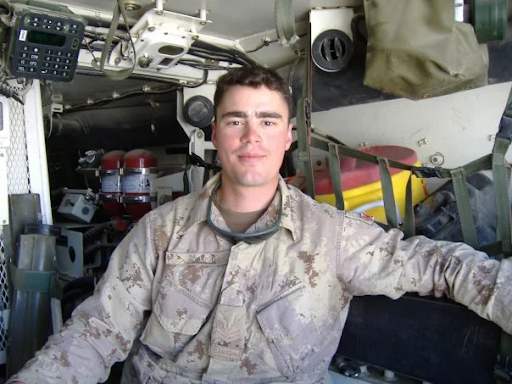The Military and Veteran Friendly Campus Project: Addressing barriers, and celebrating strength among Veteran and currently serving students at the U of A
Breanne Bradley, RSW and Suzanne Triance-Wright, MSW - 07 November 2022

Sergeant George Miok, a Sherwood Park resident and University of Alberta graduate was a Canadian hero.
Sergeant George Miok, a Sherwood Park resident and University of Alberta graduate was a Canadian hero. He was a reservist with the Edmonton 41 Combat Engineer Regiment and upon graduation became a physical education teacher at St. Cecilia Junior High School in northeast Edmonton.
While earning his BEd from the U of A, Miok volunteered for peacekeeping duty in Bosnia. He then did his first tour in Afghanistan in 2006. Upon returning, he found his job teaching Grade 7 at St. Cecilia's Junior High School in 2008. In September 2009, Miok started his second tour of duty in Afghanistan. On December 30th, at 28 years old, Miok was killed after an armored vehicle he was in struck an improvised explosive device (IED) near Kandahar City. Corporal Zachery McCormack, Sergeant Kirk Taylor, Private Garrett Chidley, and reporter Michelle Lang were also killed in the explosion.
Following his death, friends and family of Sergeant Miok endowed a scholarship to the University of Alberta’s Faculty of Education in his name. Honoring Sergeant Miok’s memory and his service within the military and education is a photo that hangs in the Education building on campus.
Those who do return from their military operations are often faced with release into civilian life due to physical or psychological injuries acquired from their service. Others leave voluntarily or at the end of contracts to pursue new endeavors. These Veterans are then confronted with navigating the culture shock of returning to the civilian world, and faced with retraining in a new field of work. In their pursuit of new civilian vocations, these Veterans enroll in colleges, technical institutes and universities such as the U of A.
Due to their military training, personal characteristics, work ethic, and steadfast commitment, student military members and Veterans are uniquely positioned for academic success. They arrive at post-secondary with advanced technical skills along with proficiency in multiple languages (Haynie, Michael, in The Business Case for Hiring a Veteran: Beyond the Clichés). Additionally, military training actively promotes diversity through international partnerships that hone characteristics such as adaptability, self-discipline, leadership and management skills, work ethic, teamwork, professionalism, resilience and mental fortitude (Zoli, Maury, Fay). According to Syracuse University, after graduation these students are more likely to demonstrate appreciation and loyalty towards their institution, have lower unemployment rates than those without degrees, and have higher annual incomes. They also act as agents for social good on campus, since Veterans as a group are members of society who consistently participate in volunteerism, civic engagement and philanthropic activities.
Unfortunately, one of the most significant barriers our military and Veteran students face in the pursuit of higher education is the perception among some that they would not be welcome, supported or valued in an academic setting. Dispelling these notions requires that post-secondary institutions develop a keen awareness and understanding of the individual and societal factors that underlie and influence these perceptions, to mitigate the unique challenges that student Veterans face.
The Military & Veteran Friendly Campus (MVFC) initiative was born out of the acknowledgement that military members and Veterans bring so much to post-secondary campuses, but also that change is needed to support their success. At the U of A, this pilot project is working to address these barriers and celebrate the strengths that these students bring to our community. Funded by the Government of Alberta and supported through the Office of the Dean of Students and the Heroes in Mind Advocacy and Research Consortium (HiMARC), the MVFC is making structural and cultural changes to transform our campus into a more inviting and inclusive environment for military and Veteran students. At the end of the pilot project, the goal is to have created a toolkit that can be implemented across U of A campuses and further shared nationally in order to support a collective approach to Veteran transition.
Schools must be committed and prepared to support transitioning military members and Veterans through the recruitment, enrolment and attendance phases of their degrees, while also building military cultural competence into the institution.3 “Through enhanced collaboration, the establishment of valuable alumni networks, and an unwavering commitment to developing quality support systems, low and high veteran enrolment schools alike will achieve a remarkable return on investment. It is without question that by ensuring all student veterans receive the crucial support and quality education that they so desire and deserve, we will generate immeasurable gains for the institutions and communities of our future generations.” 3
As Remembrance Day approaches and you move through Veterans’ Week, we invite U of A students, faculty and staff to reflect on our biases and possible misconceptions about military and Veteran students. Consider how each of us can contribute to creating a welcoming and inclusive campus for Veteran and military students. Veterans appreciate Canadians understanding the price of freedom, and the torch carrying the memory of their sacrifices falls to all Canadians to carry forward. Throughout Veterans’ Week, take time to discover the stories of those who have served Canada at home, around the world and across generations. Service, Courage and Sacrifice.
Breanne Bradley, RSW and Suzanne Triance-Wright, MSW
The Military and Veteran Friendly Campus Project